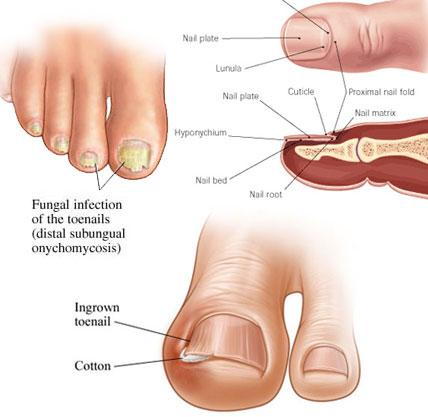Our toenails play a crucial role in our overall health, serving as diagnostic tools that can indicate underlying systemic diseases. Changes in the appearance or condition of our toenails can provide important signals about our well-being. For instance, pitting and increased thickness of the nails may indicate psoriasis, while concave nails that curve inward can be a sign of iron deficiency anemia. When you notice any discoloration, infection, or other abnormalities affecting your toenails, it’s essential to consult a podiatric physician.
At Southern Maryland Foot & Ankle, we specialize in diagnosing and treating various toenail conditions. Two of the most common problems we see are ingrown toenails and fungal toenails.
Ingrown Toenails
Ingrown toenails, medically known as onychocryptosis, are the most prevalent nail impairment. This condition occurs when the corners or sides of the toenail grow into the soft tissue of the nail groove, leading to irritation, redness, swelling, and pain. While toenails typically grow straight out, factors such as improper trimming or shoe pressure can cause one or both corners to dig into the flesh, resulting in this painful condition.
Causes of Ingrown Toenails
Several factors may contribute to the development of ingrown toenails, including:
- Improperly Trimmed Nails: Cutting nails too short or rounding the edges can increase the risk of ingrowth.
- Heredity: Genetic predisposition may play a role in nail shape and growth patterns.
- Shoe Pressure: Tight or ill-fitting shoes can cause crowding of the toes, leading to ingrown nails.
- Repeated Trauma: Regular activities that put pressure on the toes can contribute to the problem.
It’s crucial for individuals with diabetes, peripheral vascular disease, or other circulatory disorders to avoid self-treatment and seek professional medical care as soon as possible to prevent complications.
Fungal Toenails
Fungal toenail infections, or onychomycosis, are another common nail condition. Often overlooked, fungal infections can persist for years without causing pain, but they can significantly impact nail appearance and health. This condition is characterized by progressive changes in the toenail’s quality and color, which can be embarrassing and unsightly.
Symptoms of Fungal Toenails
The infection occurs beneath the surface of the nail and may lead to:
- Discoloration: The nail may appear yellow, brown, or dark.
- Foul Odor: The infection can produce an unpleasant smell.
- Debris Accumulation: Build-up beneath the nail plate may occur.
- White Marks: Often seen on the surface of the nail.
- Pain and Thickness: As the infection progresses, the nail may thicken, making it difficult to trim and painful to wear shoes.
Individuals with chronic diseases such as diabetes, circulatory problems, or weakened immune systems are especially vulnerable to fungal toenails. Other risk factors include a history of athlete’s foot and excessive sweating.
When to Seek Treatment
If you’re experiencing any issues with your toenails, including ingrown toenails or fungal infections, it’s essential to seek treatment. Our board-certified foot and ankle surgeon is equipped to diagnose and manage these conditions effectively.
Treatment Options
Depending on the diagnosis, treatment options may include:
- Ingrown Toenails: In mild cases, conservative management such as proper nail trimming and warm soaks may suffice. In more severe cases, a partial nail avulsion may be necessary to remove the ingrown portion of the nail.
- Fungal Toenails: Treatment can involve topical or oral antifungal medications. In some cases, removal of the infected nail may be required to eliminate the fungus effectively.
Conclusion
Your toenails can provide valuable insights into your overall health, making it essential to address any abnormalities promptly. If you’re experiencing any nail problems or have questions about toenail health, don’t hesitate to reach out to Southern Maryland Foot & Ankle.
For more information or to schedule an appointment, contact our Waldorf or Clinton office at (301) 868-3899 or (301) 843-9581. Don’t let nail issues affect your quality of life—take the first step towards healthier feet today!

